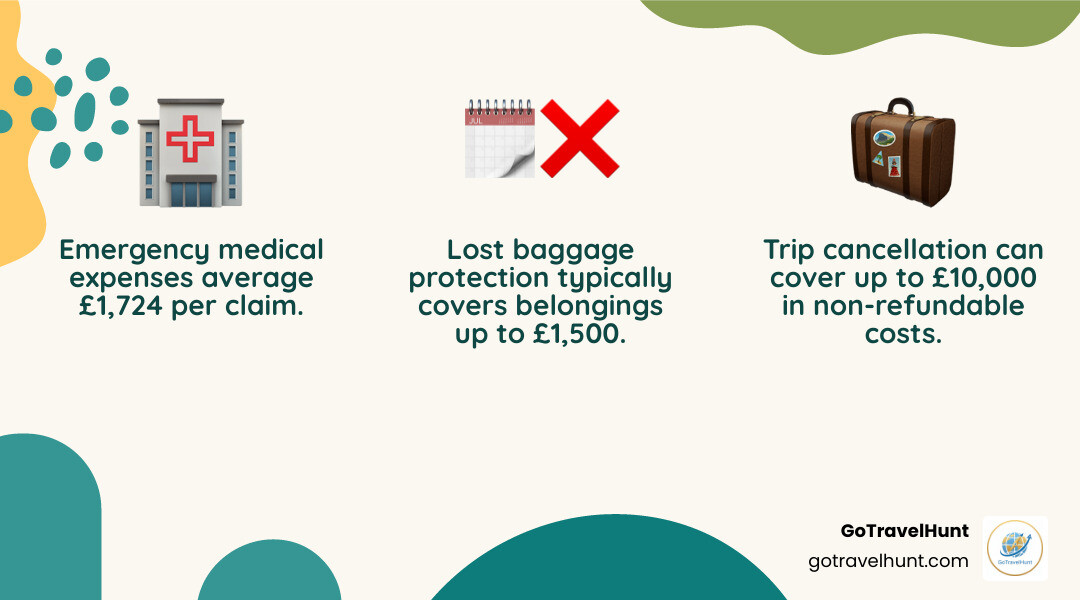Compare Holiday Insurance: 3 Smart Tips 2025
Why Comparing Holiday Insurance is Essential for Worry-Free Travel
Compare holiday insurance before your next trip to find the right balance between coverage and cost. When you compare policies, focus on these key areas:
- Medical Coverage Limits – Look for at least £5 million for international trips (£10 million recommended for cruises)
- Cancellation Protection – Ensure it covers 100% of your trip cost for unforeseen events
- Excess Amount – The amount you pay toward any claim (lower is better)
- Pre-Existing Conditions – Check if your health issues are covered
- Activity Coverage – Verify if your planned activities (skiing, diving, etc.) are included
- Age Limits – Some policies restrict coverage based on age
- Claims Reputation – Review payout rates and customer feedback
Nearly 60% of UK travellers plan at least three holidays in 2024, with travel spending on the rise. Yet roughly one in five travel insurance claims were declined in 2023. This means finding the right policy isn’t just about ticking a box—it’s about ensuring you’re actually protected when things go wrong.
Overseas medical bills, trip cancellations, and lost baggage can be financially devastating. In 2023 alone, 574,000 claims totalling £511 million were made. The challenge is that not all policies are created equal. A cheap policy might have low coverage limits or high excess payments, while the most expensive isn’t always the best for your specific trip.
At GoTravelHunt, we’ve seen how crucial it is to compare holiday insurance carefully. This guide breaks down what you need to know to find the right protection for your travels.

Glossary for compare holiday insurance:
Understanding the Essentials of Holiday Insurance

Travel insurance is a financial safety net for unexpected events like illness, cancelled flights, or lost luggage. Without it, you’re responsible for the costs. The average medical claim in 2023 was £1,724, but severe emergencies, especially in places like the USA, can cost tens of thousands.
When you compare holiday insurance, you’ll find policies bundle different coverages. Travel medical insurance handles health emergencies like hospital stays, doctor visits, and medical evacuation, which your regular health plan likely won’t cover abroad. In contrast, trip insurance protects your financial investment, covering cancellation, interruption, delays, and lost baggage.
Credit card travel benefits and airline protection often have lower limits, strict rules, and significant coverage gaps. They are rarely a substitute for a comprehensive, standalone policy.
One key term is the ‘excess’ or deductible. This is the amount you pay on a claim before the insurer pays the rest. A higher excess usually means a lower premium, but more out-of-pocket cost if you claim.
EHIC/GHIC vs. Comprehensive Travel Insurance
For travel in Europe, a European Health Insurance Card (EHIC) or Global Health Insurance Card (GHIC) is useful but not a substitute for travel insurance. These cards give you access to state-provided healthcare at local rates in EU countries, but they have major gaps.
Here’s what these cards don’t cover:
- Medical transportation back home (repatriation)
- Trip cancellation or interruption
- Lost or stolen belongings
- Private medical treatment
Existing EHICs are valid until they expire; UK residents now apply for a GHIC. Regardless of which card you have, comprehensive travel insurance is essential to fill these crucial gaps. Think of your EHIC/GHIC as a supplement, not your main protection. For complete details, check out More on the UK Global Health Insurance Card (GHIC).
When you compare holiday insurance policies, look for comprehensive coverage that properly protects you in every scenario.
Decoding Your Coverage: What’s Included and What’s Not

Understanding your policy’s benefits, limits, and exclusions is key, as these vary dramatically between providers. When you compare holiday insurance, find a policy that fits your specific trip, whether it’s a city break or a luxury cruise.
Common Types of Holiday Insurance Policies
- Single trip insurance covers one trip from start to finish.
- Annual or multi-trip insurance covers unlimited trips within a year (up to a set duration per trip). It’s usually more cost-effective for three or more trips annually.
- Comprehensive insurance is the gold standard, bundling medical, cancellation, and baggage cover to protect your health and financial investment.
- Specialist policies are designed for specific needs. Cruise insurance covers risks like missed port calls or on-board medical emergencies (see our Cruise Travel Insurance guide). Student travel insurance is for longer study or gap year trips. Adventure or sports insurance is needed for high-risk activities. Backpacker insurance covers long-term travel, while our One Way Travel Insurance Complete Guide details options for open-ended journeys.
Key Benefits Typically Included in a Policy
- Emergency medical and evacuation coverage is the cornerstone of any policy. It covers hospital stays, doctor visits, and transport to adequate medical facilities or back home. Look for at least £5 million in medical coverage (£10 million for cruises).
- Trip cancellation coverage reimburses your pre-paid, non-refundable costs if you must cancel before departure for a covered reason. Our Travel Cancellation Insurance guide explains this in depth.
- Trip interruption coverage reimburses the unused portion of your trip and extra travel costs if you have to return home early.
- Baggage delay and loss coverage reimburses you for essential items if your bags are delayed and helps replace them if they are lost or stolen.
- Lost or stolen passports coverage helps with replacement costs.
- Trip delay coverage covers expenses like meals and accommodation if your transport is significantly delayed.
Common Exclusions and Special Add-Ons
Understanding exclusions is crucial to avoid denied claims. Common ones include:
- Undeclared pre-existing medical conditions: You must declare all health conditions when you buy your policy.
- Changing your mind: Deciding you no longer want to travel is not a covered reason for cancellation.
- High-risk activities: Standard policies often exclude activities like skiing or scuba diving unless you buy an add-on.
- Incidents under the influence of alcohol or drugs: Claims related to these are typically rejected.
- Government travel advisories: Travelling to a destination against official advice may invalidate your policy.
Money-saving tip: Check your home insurance policy. It may already cover personal belongings while travelling, so you can avoid paying for duplicate coverage.
For ultimate flexibility, consider Cancel For Any Reason (CFAR) coverage. This optional add-on lets you cancel for reasons not covered by standard policies, reimbursing 50-75% of your costs. You must buy it shortly after your initial trip deposit (usually within 10-21 days).
How to Compare Holiday Insurance and Find the Best Deal

Finding the right holiday insurance is about protecting your investment and peace of mind. When you compare holiday insurance, aim for the best value—solid coverage at a fair price—not just the cheapest option.
Key Factors That Determine Your Premium
Several factors influence your insurance premium:
- Traveler’s Age: Premiums increase as you get older, especially over 65.
- Trip Duration: A longer trip means a higher premium.
- Destination: Countries with high medical costs, like the USA, are more expensive to insure.
- Coverage Level: More comprehensive plans with higher limits cost more.
- Deductible (Excess): A higher deductible lowers your premium but increases your out-of-pocket cost per claim.
- Number of Travelers: Family policies can offer value, but prices may be based on the eldest traveler.
A Step-by-Step Guide to Compare Holiday Insurance
The best time to buy travel insurance is as soon as you book your trip, or within 7-21 days of your first payment. This ensures you’re covered for cancellation and may open up time-sensitive benefits like pre-existing condition waivers and ‘Cancel For Any Reason’ coverage.
When you compare holiday insurance, look beyond the price. Check coverage limits (e.g., at least £5 million for medical), ensure cancellation covers your full trip cost, and research the provider’s reputation. With one in five claims declined in 2023, a reputable insurer with good reviews is crucial.
Read the fine print for exclusions and note the excess amount. A cheap policy might exclude your activities or have a high excess, costing you more if you claim.
Comparison websites are invaluable. Enter your details once to see multiple quotes side-by-side, letting you filter by needs, compare coverage, and read reviews efficiently.
Tips to Compare Holiday Insurance for the Best Value
- Assess your needs first: Are you on a beach holiday or a trekking adventure? Your policy should fit your trip.
- Read the policy wording: This document details what is and isn’t covered. A few minutes of reading can save you thousands.
- Check for duplicate cover: Your credit card or home insurance might already cover some items, so you don’t pay twice.
- Look for specialized options: For trips to specific regions, resources like Cheap Travel Insurance Ireland can help you find value-focused policies.
Finding the right insurance is about finding the best value for your specific trip, ensuring you travel with genuine protection.
Navigating Special Circumstances and Making a Claim
Understanding how your insurance handles special situations and knowing the claims process can prevent major headaches. Just as travel styles differ, so do insurance needs.
Insurance Considerations for Different Travelers
- Seniors (over 65) often face higher premiums and more medical questions. While some policies have age limits, specialist insurers cater to older travellers, even over 80. The MoneyHelper directory for specialist insurers is a useful resource.
- Students can find policies designed for long-term study abroad or gap years, often with budget-friendly pricing.
- Families and groups can benefit from family policies that cover everyone. For groups of 10+, a dedicated group policy may be necessary. Our guide on Travel Insurance for Children explains what to look for.
- Solo travellers should prioritize policies with strong 24/7 emergency assistance and personal liability coverage.
Pre-Existing Conditions, Travel Advisories, and Post-Departure Issues
The golden rule for pre-existing medical conditions is to declare everything to your insurer, no matter how minor. Failing to do so is the top reason for claim denials. Many policies will cover stable conditions for an extra premium.
Government travel advisories can invalidate your insurance. Check Canada’s travel advisories by destination (or your own government’s equivalent) before booking and departure. Travelling against an “avoid travel” warning will likely void your coverage.
Brexit has introduced new rules for UK travellers in Europe. Be aware of passport validity requirements (issued within 10 years, 3 months validity left) and the 90/180-day rule for the Schengen Area to avoid issues that could affect your trip and insurance.
Buying or extending insurance after departure is sometimes possible with specialist policies but is more expensive and involves a waiting period before coverage starts. It’s always best to compare holiday insurance and buy before you leave.
How to Make a Successful Travel Insurance Claim
To make a successful claim, follow these steps:
- Contact your provider immediately: Most insurers have a 24/7 emergency line. For medical issues, get approval before incurring major costs.
- Gather all necessary documents: Keep every receipt, police report (with a crime reference number), medical report, and airline delay confirmation.
- Keep detailed records of events: Note down dates, times, names, and a clear account of what happened.
- Submit your claim form promptly: Insurers have deadlines for submissions. Missing them can void your claim.
Being organized and proactive dramatically increases your chances of a smooth, successful claim.
Frequently Asked Questions about Holiday Insurance
Here are answers to some of the most common questions about travel insurance.
Do I need travel insurance if I’m only travelling domestically?
Yes, you should consider domestic travel insurance. Your standard health plan may not cover everything, even within your own country. For example, in Canada, travel outside your home province can leave you with bills for ambulances or prescriptions. In the UK, domestic insurance protects your investment against cancellations, transport issues, or lost luggage for trips of three nights or more.
While not legally required, domestic travel insurance provides a crucial safety net for unexpected events close to home.
What is the difference between ‘trip cancellation’ and ‘trip interruption’ coverage?
These terms protect different stages of your journey.
Trip cancellation reimburses your pre-paid, non-refundable costs if you have to cancel before you leave for a covered reason, such as illness or a family emergency.
Trip interruption, on the other hand, covers you after your trip has begun. It reimburses you for the unused portion of your holiday and extra costs to get home if you have to cut your trip short.
When you compare holiday insurance, ensure your policy includes both.
Can I get travel insurance if I have a pre-existing medical condition?
Yes, you can get travel insurance, but you must be completely honest with the insurer. The golden rule is to declare every medical condition when you apply. Failure to do so will likely invalidate your policy if you make a related claim. Insurers need this information to assess risk accurately.
They will typically ask about your condition’s stability. While some standard policies might charge more or exclude certain conditions, you have options. Purchasing a policy soon after booking your trip can sometimes provide a waiver. For more complex situations, specialist providers exist who focus on travellers with health conditions. The MoneyHelper directory for specialist insurers is an excellent place to find them.
The coverage might cost more, but it provides essential peace of mind.
Conclusion
The key takeaway is simple: compare holiday insurance before you book your next trip. It’s not the most exciting part of planning, but it’s one of the most important.
As we’ve seen, travel insurance is a crucial financial safety net for medical emergencies, cancellations, or lost luggage. A cheap policy can leave you exposed, while the most expensive isn’t always the best fit. The goal is to find a balance between comprehensive protection and value for money.
We’ve also found that the details truly matter. Understanding your policy’s specifics—from exclusions to declaration requirements—is vital. A fifth of claims were declined in 2023, often due to misunderstandings about coverage.
You now have the knowledge to make an informed decision: when to buy, what to look for, and how to claim. You know that government health cards aren’t a substitute for comprehensive coverage and that specialist policies are available for specific needs.
At GoTravelHunt, we want you to travel with confidence. Taking the time to properly compare holiday insurance gives you the freedom to explore, knowing you’re protected. The right policy means you can focus on what really matters: experiencing the world and creating memories that last a lifetime.
Ready to protect your next adventure? Find the perfect travel insurance for your next Australian adventure and start planning with peace of mind.












